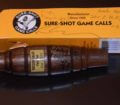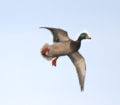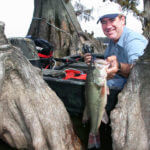Editor’s Note: Often the world’s greatest poets, writers and artisans are rarely ever recognized during their lifetimes. Many of the legends of the outdoors have seen their skills and the products they’ve crafted eventually start to have great value. One such product is a handmade, hand-crafted wooden duck call from yesteryear that still brings a high price today from duck-call collectors and duck hunters – the Yentzen Classic, invented and patented by George Yentzen, and James “Cowboy” Fernandez in the early 1950s. Yentzen had cut his first black-walnut duck call on a band saw on his back porch in Nederland, Tex. before that. The design of this Yentzen Classic double-reed duck call with reeds held together by rivets was truly amazing. Cowboy won the World’s Championship Duck Calling Contest in Stuttgart, Arkansas, in 1959 and Charles Stepan in 1962 with this Yentzen. If you’ve ever blown a duck call or hunted ducks, this week’s story is one you’ll thoroughly enjoy.
 “Today we do make a plastic duck call, because some duck callers prefer plastic calls,” Curtis Arnold, the grandson of James “Cowboy” Fernandez, one of the makers of the Yentzen Classic duck call, mentions. “But we still manufacture the wooden Yentzen duck calls, since wood absorbs sound and gives the call a softer and more-mellow sound than a plastic call can produce. Personally, I keep a wooden call on my lanyard when I’m calling ducks. When ducks get in close, and I want to finish them off, I don’t want to flare them. I prefer a more-natural sounding call like the Yentzen Classic produces. I do most of my hunting in my home state of Texas. The ducks we get in Texas have been shot at all the way down the flyway. They’re well-educated, and they listen to duck calls more intently here in Texas than when they’re in the northern part of the flyway at the beginning of their migration.”
“Today we do make a plastic duck call, because some duck callers prefer plastic calls,” Curtis Arnold, the grandson of James “Cowboy” Fernandez, one of the makers of the Yentzen Classic duck call, mentions. “But we still manufacture the wooden Yentzen duck calls, since wood absorbs sound and gives the call a softer and more-mellow sound than a plastic call can produce. Personally, I keep a wooden call on my lanyard when I’m calling ducks. When ducks get in close, and I want to finish them off, I don’t want to flare them. I prefer a more-natural sounding call like the Yentzen Classic produces. I do most of my hunting in my home state of Texas. The ducks we get in Texas have been shot at all the way down the flyway. They’re well-educated, and they listen to duck calls more intently here in Texas than when they’re in the northern part of the flyway at the beginning of their migration.”
The Yentzen calls originally were made from hand-turned black-walnut wood and are made even today from that same wood. As Arnold explains, “Black walnut is one of the most-durable woods and has one of the prettiest finishes after being sanded.”
As duck hunters of old learned, the durability of the Yentzen calls meant that the calls had much longer lives and could endure many years of duck hunting in all types of weather, which as Charlie Holder, the owner of Sure Shot Game Calls, explains was one of the main reasons these calls were so preferred by duck-calling enthusiasts. As Charlie emphasizes, “That durability was the good news. But due to those Yentzen calls never wearing out, Sure-Shot couldn’t continue to sell the same customers more duck calls.”
 “Another distinguishing characteristic of the Yentzen Calls is the fit of the insert into the call’s barrel (the top of the call),” Curtis Arnold reports. “The tolerances between the top of the call and insert are very critical. To get a perfect fit, we use a hand reamer that reams out the inside of the barrel to make sure the fit is good and tight. We have to hand ream a little bit of the barrel at a time. The insert must go in, so that it’s not so tight you can’t pull it out, yet not so loose that you don’t get that perfect fit.”
“Another distinguishing characteristic of the Yentzen Calls is the fit of the insert into the call’s barrel (the top of the call),” Curtis Arnold reports. “The tolerances between the top of the call and insert are very critical. To get a perfect fit, we use a hand reamer that reams out the inside of the barrel to make sure the fit is good and tight. We have to hand ream a little bit of the barrel at a time. The insert must go in, so that it’s not so tight you can’t pull it out, yet not so loose that you don’t get that perfect fit.”
A unique quality of the Yentzen Classic call is that instead of having dimples on the reeds to keep the reeds from sticking, the Yentzen calls feature brass rivets. “When moisture builds-up inside a call from your breath, and the air temperature is chilly, the reeds of a call often will stick together and cause the call to malfunction,” Curtis Arnold says. “But the brass rivets prevent the reeds from sticking and allow the call to be blown – even in extremely-cold temperatures. Plastic reeds always want to return to the form in which they were created, as much as possible. So, the dimples that separate the reeds over time want to push back and become a part of the flat reed. A dimple is much like repairing a leaky radiator hose on your car with duct tape. The duct tape will hold for a while, but sooner or later, you’ll have to replace the hose. However, the brass rivets won’t go away and won’t give out.”
 The rivets that separate the reeds also explain the longevity of the Yentzen calls. “Every Yentzen call is tested and adjusted to make sure it produces a sound as good if not better than the original Yentzen calls did,” Curtis Arnold emphasizes.
The rivets that separate the reeds also explain the longevity of the Yentzen calls. “Every Yentzen call is tested and adjusted to make sure it produces a sound as good if not better than the original Yentzen calls did,” Curtis Arnold emphasizes.
To learn more about Sure-Shot Game Calls in Groves, Texas, go to http://sureshotgamecalls.com.










